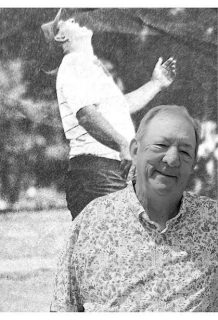Reader taken out of comfort zone
Published 1:00 am Sunday, July 13, 2014

- sunreader_locust
“The Locust Effect: Why the End of Poverty Requires the End of Violence” by Gary A. Haugen and Victor Boutros. New York: Oxford University Press, 2014. 368 pages, $27.95.
“The rains had been good, the wheat fields were bursting with promise, the vegetable gardens were abundant, and the livestock ready to be off their winter rations,” Gary A. Haugen and Victor Boutros explain in “The Locust Effect: Why the End of Poverty Requires the End of Violence,” their new collaboration on why poor countries seem to experience significantly more social unrest than their more developed counterparts. “But, in a matter of hours, it was all swept away. In 1875, trillions of locusts weighing 27 million tons swarmed over nearly 200,000 square miles across the American Midwest (an area greater than California) and ate everything – everyday consuming the equivalent of what 2.5 million men would eat.”
Trending
“Likewise, it seems that we are approaching a pivotal moment in history where agreement is beginning to emerge that if we do not decisively address the plague of everyday violence that swarms over the common poor in the developing world, the poor will not be able to thrive and achieve their dreams – ever,” they note.
This book was an eye-opener. Not unlike many readers, I have been acutely aware of the enormous challenges the economically disadvantaged face on a daily basis. Although I was not raised in an affluent family – my dad still talks about weeks in which his paycheck was around $50 – I have always known that having access to more resources does impart certain advantages to those with such access. At the same time, I have always been aware that we live in a violent world – regardless of whether I was touched personally by violence. On the surface, my childhood in rural Tennessee did not seem to be affected directly by the hostile acts of others. Conversely, I grew up in an era defined by brutality and bloodshed. Every evening, civil rights struggles, the Vietnam War and a myriad of other events characteristic of the uncertain times of the 1960s were routinely brought into my consciousness through the still newly emerging medium of television.
But the shadowy connection between poverty and violence seldom crossed my mind – until I picked up a copy of this book.
Here, Haugen and Boutros make the argument, in a thoroughly convincing and vivid manner, that not only is the relationship very real, but it threatens the fabric of our social institutions in ways that extend far beyond the principal characters at the heart of their thesis. The literary style on display in “The Locust Effect” is what you would expect from two authors well versed in legalese, although they do bring a certain clarity to the issues they are discussing that is often missing in similar tomes. I was somewhat surprised at how inherently readable and relatable their prose is as they move seamlessly from one episode to the next in building their case. They genuinely want the reader to know how we got to this point and what the true consequences are for our collective apathy – and not just in the so-called developing countries.
Throughout history and within virtually all cultures, the move from chaos, disorder and unruliness to civility, order and respect for the rule of law has been a universal theme and a natural progression, as the authors note in “It’s Been Done Before,” the 10th chapter: “Wherever you now have a reasonably functioning criminal justice system that provides common citizens with a basic level of protection from violence, at some time in history, in that exact same place, you once had a criminal justice system that was thoroughly corrupt, abusive, incompetent, in exclusive service to a political or economic elite, and a failure at protecting the poorest and most vulnerable from violence.”
Haugen is founder and president of International Justice Mission, an international human rights agency. Prior to assuming his current position, he led the United Nations investigation into the Rwandan genocide and has been recognized by the U.S. State Department for his anti-slavery efforts. Haugen has a bachelor’s degree from Harvard University as well as a law degree from the University of Chicago. Boutros is a federal prosecutor known for his aggressive pursuit of alleged police misconduct, hate crimes and human trafficking. He has degrees from Baylor, Harvard, Oxford and the University of Chicago and has taught trial advocacy to lawyers from Latin America, South and Southeast Asia and Africa. “The Locust Effect” is extensively researched with 36 pages of source notes at the conclusion of the 11 chapters that constitute the main text.
Trending
Much of the book is taken up describing the extent of the problem, which Haugen and Boutros do most eloquently. Be forewarned, some of the narrative is graphic to the point of being repulsive; i.e., it was difficult to acknowledge that we live in a world that allows such depravity and degeneracy. I kept waiting for the authors’ proposed resolution to the widespread epidemic they were outlining so powerfully. Unfortunately, such an over-arching strategy was not forthcoming – and maybe that was their real intent in writing this book. Raising public awareness of the extent of the problem is obviously a necessary first step in effectively dealing with the atrocities that have come to exemplify our world. It was just frustrating and a little exasperating to get to the end of the book and discover that there was no real plan for dealing with such a widespread global imbroglio.
If you want to be shaken out of your comfort zone, this book will definitely accomplish that. After reading “The Locust Effect,” you’ll be simultaneously disgusted and fired up. You’ll want to roll up your sleeves and start the arduous process of making the world a better place for all its inhabitants. You just won’t know exactly how to proceed.
— Reviewed by Aaron W. Hughey, Department of Counseling and Student Affairs, Western Kentucky University.






